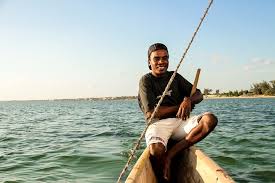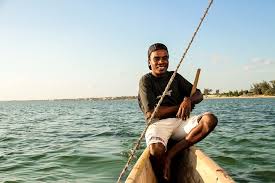
Dailycsr.com – 30 March 2019 – The fishermen of Madagascar use their fishing canoes, called pirogues, to venture out in the sea for several hours on a daily basis. Earlier, upon their return, their baskets would be filled to be brim with fish, but now the “catch sizes” are dwindling away as a result of overfishing coupled with extreme weather situation and the rising temperatures of the sea. Weconnex, a “Swiss social enterprise”, is educating these fishermen “sustainable fishing techniques” besides providing market accessibility support in an attempt to “preserve their livelihoods”.
In fact, due to the rising sea temperature around Madagascar, recently coral reefs have undergone bleaching whereby destroying “the natural habitat of various marine species”. Moreover, the extreme weather conditions bring with them the limitations of days the fishermen get to spend in the sea.
On the other hand, the droughts across the country affect the agricultural crops on land which translates into “migration to coastal areas” for marine fish turn out to be “the single source of food and income, fuelling socioeconomic tension between newcomers and long-term residents”.
Amid these various challenges are also the harmful practice of the local fishermen of “keeping everything they catch”. Likewise, the inedible marine lives along with smaller fish that get entangled in their nets are not returned to the sea which in turn destroys further the ecosystem balance of the ocean. Therefore, drastic action is required to stop these fishermen from “fishing their livelihoods away”.
There is an integrated approach to tackle the situation as NGOs are trying to regulate the “fishing activities”, although “desired results” are yet to be achieved given the lack of regulation from the government. Over seven percent of Madagascar’s GDP is dependent on “fisheries and aquaculture” as nearly two million inhabitants rely on “small-scale fisheries for food and income”. With the continued exploitation of marine resources, the future income of Madagascar’s people comes under question.
It is here that Weconnex observed a gap which could be bridged by “educating fishermen on sustainable fishing practices” along with boosting their profits. Nexus Centres are “local infrastructure hub” that were created to build up “core infrastructure for the whole fishery value chain” as it takes a holistic and “market-oriented approach”. In this effort, Weconnex looked into improving the “quality of the catch”, its transportation to the market, improving fishing skills such as teaching them to “pack the fish on ice at sea to keep it fresh” which increasing its value over longer time.
In fact, The Guardian reported:
“Weconnex also helps organise the fishermen into co-operatives, where they become shareholders of Nexus, which operates the centres. This company oversees the logistics of getting fish to market, as well as sales at market. Thanks to better quality and regulated quantities, improved prices can be negotiated. This integrated value chain stabilises and increases fishermen’s income in the long term and it allows the sustainable development and operation of rural infrastructure”.
Thanks to this inclusive business model, “49% of the Nexus company belongs to the local fishermen; the other 51% belongs to its investors”. In this way, the company takes “everyone’s goals” into account. Rural populations are tapped through Nexus which does not limit to fisheries and develops “alternative sources of income”.
The said model besides fostering economic inclusiveness also empowers the local producers, while the “aim is to build an ecosystem in which everyone is better off”.
References:
3blmedia.com
In fact, due to the rising sea temperature around Madagascar, recently coral reefs have undergone bleaching whereby destroying “the natural habitat of various marine species”. Moreover, the extreme weather conditions bring with them the limitations of days the fishermen get to spend in the sea.
On the other hand, the droughts across the country affect the agricultural crops on land which translates into “migration to coastal areas” for marine fish turn out to be “the single source of food and income, fuelling socioeconomic tension between newcomers and long-term residents”.
Amid these various challenges are also the harmful practice of the local fishermen of “keeping everything they catch”. Likewise, the inedible marine lives along with smaller fish that get entangled in their nets are not returned to the sea which in turn destroys further the ecosystem balance of the ocean. Therefore, drastic action is required to stop these fishermen from “fishing their livelihoods away”.
There is an integrated approach to tackle the situation as NGOs are trying to regulate the “fishing activities”, although “desired results” are yet to be achieved given the lack of regulation from the government. Over seven percent of Madagascar’s GDP is dependent on “fisheries and aquaculture” as nearly two million inhabitants rely on “small-scale fisheries for food and income”. With the continued exploitation of marine resources, the future income of Madagascar’s people comes under question.
It is here that Weconnex observed a gap which could be bridged by “educating fishermen on sustainable fishing practices” along with boosting their profits. Nexus Centres are “local infrastructure hub” that were created to build up “core infrastructure for the whole fishery value chain” as it takes a holistic and “market-oriented approach”. In this effort, Weconnex looked into improving the “quality of the catch”, its transportation to the market, improving fishing skills such as teaching them to “pack the fish on ice at sea to keep it fresh” which increasing its value over longer time.
In fact, The Guardian reported:
“Weconnex also helps organise the fishermen into co-operatives, where they become shareholders of Nexus, which operates the centres. This company oversees the logistics of getting fish to market, as well as sales at market. Thanks to better quality and regulated quantities, improved prices can be negotiated. This integrated value chain stabilises and increases fishermen’s income in the long term and it allows the sustainable development and operation of rural infrastructure”.
Thanks to this inclusive business model, “49% of the Nexus company belongs to the local fishermen; the other 51% belongs to its investors”. In this way, the company takes “everyone’s goals” into account. Rural populations are tapped through Nexus which does not limit to fisheries and develops “alternative sources of income”.
The said model besides fostering economic inclusiveness also empowers the local producers, while the “aim is to build an ecosystem in which everyone is better off”.
References:
3blmedia.com


 Preserving Madagascar’s Fishermen’s Livelihoods
Preserving Madagascar’s Fishermen’s Livelihoods




 Companies
Companies